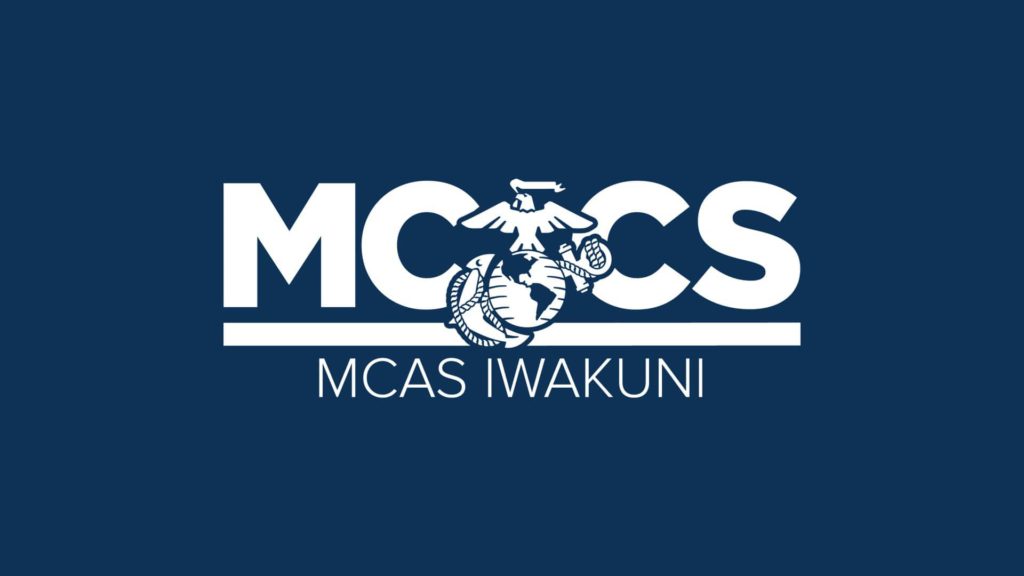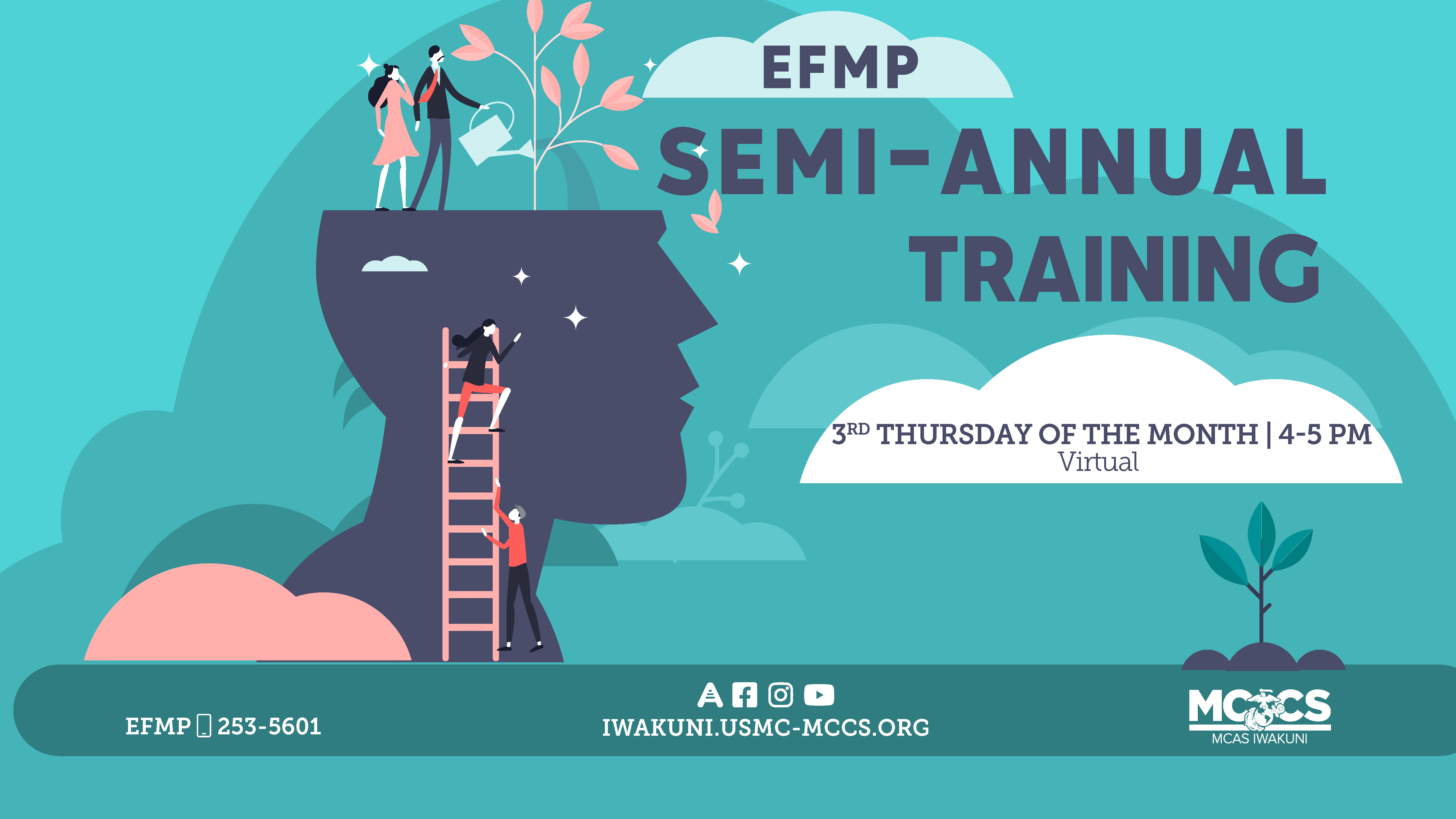Exceptional Family Member Program
We support military families with special medical and/or educational needs and ensure availability of care during transitions to improve families' quality of life.
On this page:
On this page:
Upcoming Events
May
8

Quarterly Family Training - Accessing Community Resources & Recreation Inclusion
04:00pm - 05:00pm
Location: Bldg. 625, Rm. 211
May
15

EFMP Semi-Annual Training: Successful PCS Transition
04:00pm - 05:00pm
Location: Bldg. 625, Rm. 211
Jun
19

EFMP Semi-Annual Training: SSI and Medicaid Waivers
04:00pm - 05:00pm
Location: Bldg. 625, Rm. 211
How To Get Started
The Exceptional Family Member Program is comprised of 3 components:
Eligible Exceptional Family Members Include:
- Dependent(s) of an active duty service member
- Spouse, child, or parent
- Resides with the sponsor (51%)
- Requires medical specialty care or
- Chronic medical condition requiring more than annual visits with a primary care physician
- Eligible for early intervention services (IFSP)
- Eligible for special education or related services (IEP)
Required form needed for registration:
- DD Form 2792 (all family members)
- DD Form 2792-1 (children with an Individualized Family Services Plan or Individualized Education Program)
Supplemental documentation needed as applicable (i.e., IFSP, IEP, etc.)
Completed forms can be submitted to the local EFMP office or Headquarters EFMP at hqmc.efmp@usmc.mil.
All forms can be downloaded from the DoD Forms Management Program.
Assignment Coordination
When a family member's specific medical or educational needs are documented via the DD2792 and DD2792-1, HQMC EFMP Assignment specialist use the information to match documented needs to the capability of the proposed PCS location. While the military's mission guides these assignments, when MMOA/MMEA/RAM and EFMP work together, the goal is to find an assignment that supports mission, career progression and family member needs.
Schedule an Assignment Consultation by emailing hqmc.efmp@usmc.mil
Family Support
Exceptional Family Member Program professionals help families become their own best advocates by providing:
- Information and Referrals
- Helping families successfully transition before, during and after a PCS.
- Supporting families with non-clinical case management.
- Connecting families to important resources and services, such as the School Liaison Officer.
Resources & Support
Frequently Asked Questions (FAQs)
Find quick answers to common questions about our services here.
Respite Care Program Frequently Asked Questions (FAQs)
Find quick answers to common questions about the Respite Care Program here.
The EFMP Respite Care Program is intended to reduce the stress on sponsor families by providing temporary rest periods for family members who care for a family member who has special needs. Respite care is a non-entitlement benefit intended to provide brief rest periods, that is, not more than 6 hours per day, for the primary caregiver(s) such as a date night, lunch with a friend, or to use the gym.
Respite care may not be used to fund preschool programs, daycare, or babysitting, to allow the sponsor or family member to work or attend school, or therapy sessions or therapeutic recreation, for the exceptional family member (EFM).
- EFMP enrollment is current.
- Respite care needs of the EFM have been assessed by EFMPHQ as a Level on Need (LoN) 3 or 4.
- EFM legally resides with the sponsor. Exceptions include: TAD, Official schools, Deployment, Approved Continuation on Location (CoL), or OCONUS tour where dependent travel has been declined by HQMC EFMP or Overseas Screening, due to a lack of care for the EFM.
- Sponsor has provided supporting documentation of the provider’s qualifications such as a copy of his/her certification or license.
- Sponsor or power of attorney has signed the EFMP Respite Care Program forms.
HQEFMP medical screeners use a standardized assessment process to determine the LoN. The medical screeners review the sponsor’s submitted documentation including the DD-2792, DD-2792-1, IEP, IFSP, and other relevant documentation to assess the need(s) of the EFM and identify the minimum level of provider skill required, to maintain the health and safety of the EFM.
- LoN 3: Refers to children 18 years old and younger who have severe special needs. The respite care provider will be over the age of 18 and have valid certification through a state or national agency. Appropriate certified providers will vary depending on the needs of the EFM. (Examples include: CNA, mental health technician, BCaBA).
- LoN 4: Applies to family members of all ages who have profound special needs. The respite provider will be over the age of 18 and hold a valid professional license. The appropriate licensed provider will vary depending on the needs of the EFM. (Examples include: RN, LCSW, BCBA, LMFT, and special education teacher).
EFM care needs may change and require a change in identified LoN. An enrollment update, with additional supporting documentation, is required for a review of LoN.
Please contact the EFMP office as there is a standardized review process that HQEFMP undertakes. Additional supporting documentation may be required. Your family case worker will advise of the process and outcome.
USMC EFMP does not use categories to make decisions. USMC EFMP initiated the LoN determination. Categories are used for administrative purposes only and will not impact respite care, assignments, or enrollment/endorsement decisions.
Adult EFMs, who are LoN4, are eligible for respite care for themselves.
No. EFMP respite care funds cannot be used to provide child care for siblings of an EFM or child of an adult EFM.
Yes. Family members are eligible to provide care.
Yes. If the neighbor meets the provider requirements and the care complies with Base Orders. Respite care provided in the sponsor’s government-owned or leased home is not regulated by Marine and Family Programs, if the care is limited to the children of a single family and the children of the individual providing services, and care is less than 10 hours per week. EFMP respite care is not to exceed 6 hours per day.
Families are eligible for up to 20 hours of respite care, per month.
No. The 20 hours per month does not accrue.
Payment amounts are determined locally and will not exceed the established reimbursement hourly rates outlined in Marine Corps Bulletin 1754.
Contact Information and Resources
EFMP
Phone: 0827-79-6219
DSN: 253-6219
Program Manager DSN: 253-6219
Program Manager from Japan: (082) 779-6219
Program Manager from USA: 011-81-827-79-6219
Case Worker DSN: 253-3480
Case Worker from Japan: (082) 779-3480
Case Worker from USA: 011-81-827-79-3480
Training Education Outreach Specialist DSN: 253-5601
Training Education Outreach Specialist from Japan: 0827-79-5601
Training Education Outreach Specialist from USA: 011-81-827-79-5601
Email: SMBIwakuniEFMP@usmc.mil
Hours of operation:
| MON - FRI | 7:30 AM - 4:30 PM |
| SAT, SUN, & HOL | Closed |
EFMP Navy Case Liaison for Iwakuni
Michael J. Spiltener



